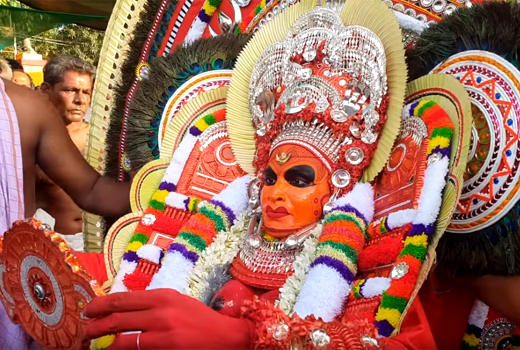
Kanhangad: Video of theyyam artiste ‘beating’ people goes viral
Mangalore Today News Network
Kerala, Nov 26, 2019: Based on a viral video of a theyyam artiste chasing and beating people during a performance in Kanjangad in Kasaragod district, the Kerala State Human Rights Commission registered a suo motu case last week and asked the district collector and the police for a report within 30 days, Yahoo reported.

The filing of the case, without even a complaint, has stirred debates once again on the extent to which rights panels can interfere in religious customs and rituals. Theyyam is northern Kerala’s ancient ritual dance form and encompasses over 400 different forms of gods, goddesses, war heroes and spirits performed at temples, sacred groves and upper-caste households across Kannur, Kasaragod districts and certain parts of Kozhikode and Wayanad districts.
The SHRC took up the case based on a video of the Moovalamkuzhi Chamundi theyyam chasing devotees and beating them with a stick during a performance at the Arayil Bhagavathy temple in Kanjangad. Thousands of people flock to the temple to witness the annual theyyam festival.
An officer at the SHRC in Thiruvananthapuram, who did not want to be named, said, "We have asked the police to investigate and file a report. Since the incident is of the nature of a criminal offence, we have asked the police for a report. Because it involves religious rituals, the collector has to look into it as well."
But scholars who have researched extensively on the ancient dance ritual dismiss such cases as ’frivolous’.
Says Raghavan Payyanad, former HOD at Calicut University and author of ’Folklore’, "This particular Moovalamkuzhi Chamundi theyyam is of a ferocious nature. It has a ’purathattu’ (hair) which is about 5-6 ft high and a stick in its hand. Usually, when it starts performing, people don’t stand close to it. In olden times, people stand along the compound walls of the ’kavu’. If the theyyam is disturbed, it has the right to beat devotees. That’s the belief."
"These days, a lot of people come to watch theyyam including those who are not devotees. These young people sometimes drink liquor and start teasing the theyyam. That’s my assumption. So naturally, the theyyam would have reacted and beaten those people. It’s happening in many places," he added.
Payyanad, who has researched extensively on different forms of theyyam, wondered why the rights panel would file a case when no one had any complaints about the incident. "The locals or the temple officials don’t have any complaints. Then why would they interfere? Such incidents must be seen in a particular context."